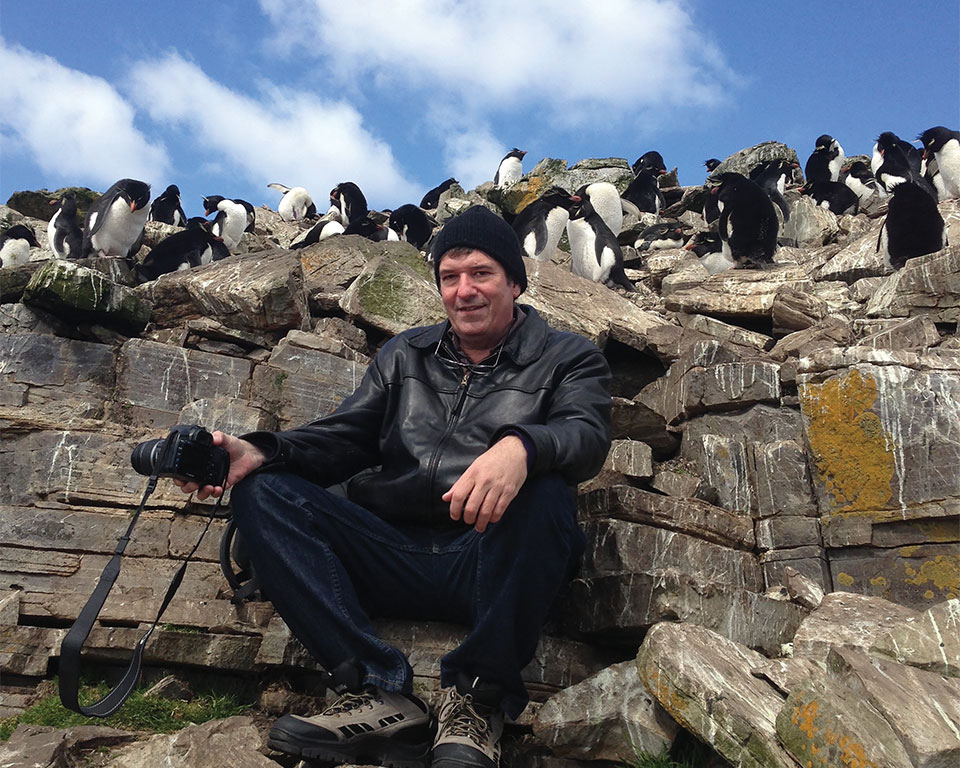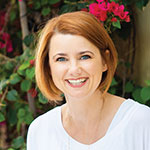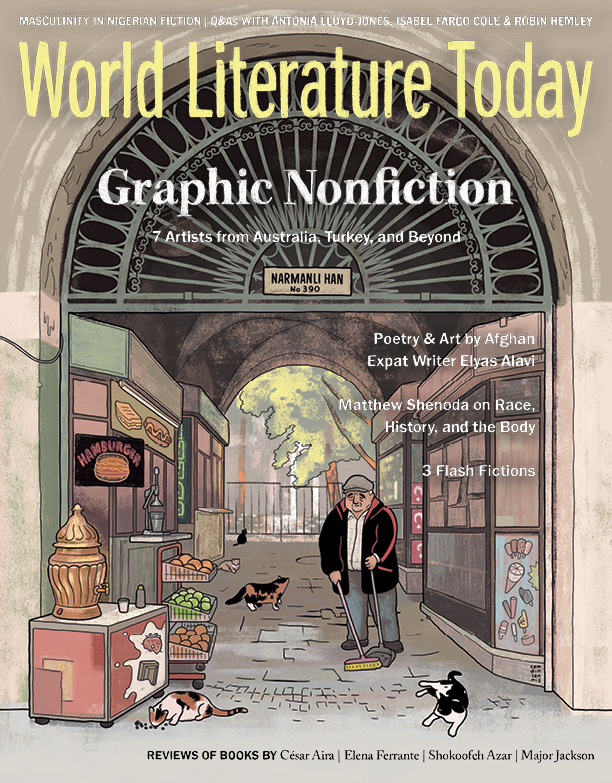Our Nations, Ourselves: A Conversation with Robin Hemley

Robin Hemley, ceaseless traveler—or as he calls it, polygamist of place—is the author of fourteen books, former director of the nonfiction writing program at the University of Iowa, and founder of NonfictioNOW, the world’s leading international conference in nonfiction. We corresponded over email about his latest book, Borderline Citizen: Dispatches from the Outskirts of Nationhood, just out from the University of Nebraska Press. In it, Hemley explores the notions of borders, nationhood, and identity, bringing readers to a number of in-between places, from a Bengali resettlement camp in India, to a preposterously extravagant Chinese mansion smack in the middle of a destitute village, to a painstakingly fabricated indoor rainforest in Nebraska.
Tiffany Hawk: Each of the locations you explore is fascinating in its own right, but I was most struck by how elegantly the various essays play off each other. It felt inevitable that they would come together as a collection. Did you envision a book when you set out to research and write about these subjects?
Robin Hemley: I’m happy that you see how the essays fit together, as I spent a lot of time on that. The answer, though, is yes and no. I envisioned a slightly different book in the beginning, but that’s almost always the case with books. The book you set out to write and the finished product are almost invariably different. In this case, I thought that every essay of mine would be about an exclave or enclave and that I would visit them all on their national holidays. This turned out to be too strict a criterion, as there were essays I was simultaneously writing that had to do with the concerns of the book but weren’t about exclaves as such. These concerns go to the heart of who I am and how I feel about my identity as a citizen in relation to other people around the world. I’ve been thinking rather intensely about these issues and won’t stop simply because the book is finished.
So it’s natural, I think, that the chapters have similar concerns, though the trick was in ordering them so that they progressed and built finally a kind of subtle argument. There are other exclaves I visited in the book that I didn’t write about because they didn’t quite gel for me the way the others did, as well as exclaves I planned to visit but never made it to. And there are essays that I didn’t initially see as part of the book that have since become integral parts, such as the essay about the Chinese billionaire and the Afghan refugee. They’re about nations, nationalism, and identity but not about exclaves as such.
Hawk: You say, “Somehow, the people with the least experience of a country tend to have the most opinions about it. The same is true of individuals: we tend to judge most heavily those whom we know the least.” That theme runs throughout the book. Fortunately the openhearted and curious manner in which you observe the world suggests the antidote. That said, human nature being what it is, do you ever find yourself making snap judgments? If so, how do you step back and reopen your mind?
Hemley: All the time, unfortunately. I come from a rather judgmental family. My mother was a smart and wonderful person in many respects, but she could be awfully judgmental, and I’ve had to constantly battle that my entire adult life. For instance, recently I was seated on a plane next to a businessman from Texas whose life revolved around sports. He seemed the polar opposite of me. But once I pushed past my initial assumptions about him, we had the most wonderful three-hour conversation about family and the odd places life can take you that you never would have predicted when you were younger. Our politics were completely different. He’s a libertarian. I told him he’d consider me a liberal. It didn’t matter. And we had one of the best plane conversations of my life. We even exchanged phone numbers. I really value such experiences because they remind me that if I fight against my snap judgments, chances are fair if not good that I’ll be surprised and possibly rewarded.
Hawk: What a lovely example. And you do make it clear in the book that we all, travelers and locals alike, tend to see the world through filters. When you’re in Point Roberts, Washington, a peninsula that belongs to the US despite being physically situated inside of Canada, and where 75 percent of the homeowners are Canadian, an American woman says to you—seemingly without sarcasm—“Welcome to Point Roberts. . . .
It doesn’t get more American than this.” To her, a place where people don’t lock their doors, kids roam free, and everyone appreciates a good pancake breakfast perfectly represents America. You show us a similarly amusing display of idealized nationalism in the Falkland Islands, where an obsession with the trappings of British heritage borders on parody. What do you think is behind our propensity to cling to simplified, or even fabricated, identities?
Hemley: It’s like team sports, isn’t it? So much of our attitudes toward our countries as well as our political affiliations are as basic and tribal as our loyalty to sports teams. That’s likely not a revelation to anyone or a particularly original thought, but I’ve never really been one to love a particular team, either. For a while, I loved the Chicago Cubs, sort of, but not in the way that some of my Chicago friends do. Back when I lived in Chicago in my twenties, a girlfriend of mine, who also wasn’t sports-minded, wondered why the Cubs couldn’t do better when they had so many people to choose from to play for them. She thought—rather absurdly, but wonderfully—that everyone who played for the Cubs was from Chicago. So, in other words, what we love about our teams, as well as our nations, often comes down to abstractions, to symbols. We love a flag, an anthem, and abstractions such as “American values” or “Britishness,” or bigger abstractions such as “freedom” and “liberty.” They’re large enough concepts that they can reduce our sense of identity to whatever we associate with those words or symbols. Abstractions are easier to show loyalty to than actual people sometimes.
What we love about our teams, as well as our nations, often comes down to abstractions, to symbols.
Hawk: In the essay “Celebrating Russian Federation Day with Immanuel Kant,” you naturally open each section with a maxim. The first is “Embrace Change (Do You Have a Choice?)” We don’t, of course, as this book illustrates through and through with its wacky borders, strange bedfellows, and unspeakable tragedies. Is fear of change—especially how it challenges fragile identities—what so much of the world’s dysfunction comes down to?
Hemley: Fear has a lot to do with it, though not always a fear of change. Sometimes, that’s exactly what people think they want: a change in political parties, a change in the status quo, change as long as it’s perceived for the better. I think, though, that there’s a recognition, whether voiced or not, that the world’s resources are dwindling and we seem to be tilting toward apocalypse, not a sudden one, but a gradual one that will overwhelm us. To me, the fatal flaw of humanity is not being able to envision a crisis until it’s right on top of us. We need asteroids bearing down on us in order to act. We’ve known this for a long time.
I took an environmental biology class in the 1970s in which I learned about greenhouse gasses and environmental degradation. In the 1970s, too, there was a moment of environmental reckoning, but as soon as the oil crisis passed, people went back to their normal wasteful ways. I recently read that Malaysia has started turning back shiploads of plastic that rich countries have been sending in the wake of China’s decision to stop accepting plastic. So now our plastic waste is a kind of refugee.
The change we fear, rightfully, is that we are making our planet uninhabitable, and people process this in different ways. One reflection of this is nationalism, in which we suddenly become super patriots with the intention of closing our borders and saying, “This is mine and you don’t get any.” It’s the simplest solution, but a stopgap measure at best, and in the end, it’s no solution at all.
The change we fear, rightfully, is that we are making our planet uninhabitable.
Hawk: Speaking of the dangers of nationalism, there’s a chilling scene where you’re in a tour van in Berlin on Holocaust Remembrance Day when suddenly you become “the other.” The driver and the other tourists, some of whom are American and none of whom realize you’re Jewish, ease their way into an increasingly resentful conversation about Jews. You consider saying something with the hope of opening their minds, but you decide to keep quiet, ultimately realizing “how easy it is to comfortably sit doing nothing and still be exterminated.” Can you talk more about that moment?
Hemley: The flipside of me making snap judgments about other people is that others are making snap judgments about me, and this would likely be amplified if I were other than white. Still, I usually make a point of letting such strangers know that I’m Jewish so that I can bring whatever snap judgments they have about that into the open. The episode in the book in which I purposefully hide that I’m Jewish in a van of people who are decidedly not the biggest fans of Jews was an important moment for me. No physical harm would have happened if I had said anything, and perhaps I should have done so, but the mood in that van completely froze me and saddened me to the point of silence. When people think it’s safe to say things they would otherwise never voice, they often do.
We all have parts of us that are intolerant or worse, and we need to tamp these down, to let our better angels, if you will, win out. Unfortunately, sometimes politicians, playing to our bigotry, give us permission to let our worst selves out into the open. We’ve been seeing it increasingly, and it won’t stop until we have better leaders. This was a particularly poignant moment for me in that it took place in Berlin.
Hawk: That scene also made me wonder if, to a greater or lesser extent, we are all borderline citizens, doing whatever we can to delay the inevitable moment that we no longer recognize the world around us. Goodness knows, technological shifts are giving us all a run for our money. What do you think?
Hemley: Yes, this is what I was talking about when I answered your question about “fear of change.”
Hawk: You’re a peripatetic soul who willingly acknowledges that travel, and travel writing, have negative consequences from appropriation to overtourism to environmental degradation. While you admit it might be rationalization, you hope that “meditative writers asking difficult questions of themselves and of the world, can offer as much as they take, or at least make an effort to do so.” What good do you hope people take from this book?
Hemley: Ultimately, I think the book is hopeful. I’m not a pessimist actually, and I love meeting people from different backgrounds than myself. I hope the book will provide readers with a slightly different understanding of nationhood and belonging than before they read it and that it might provide some insights into ways in which we can confound the dangerous results of tribalism that are all around us.
January 2020











